She Persisted
One-year after Donald Trump’s election, Planned Parenthood president Cecile Richards talks about the road ahead.
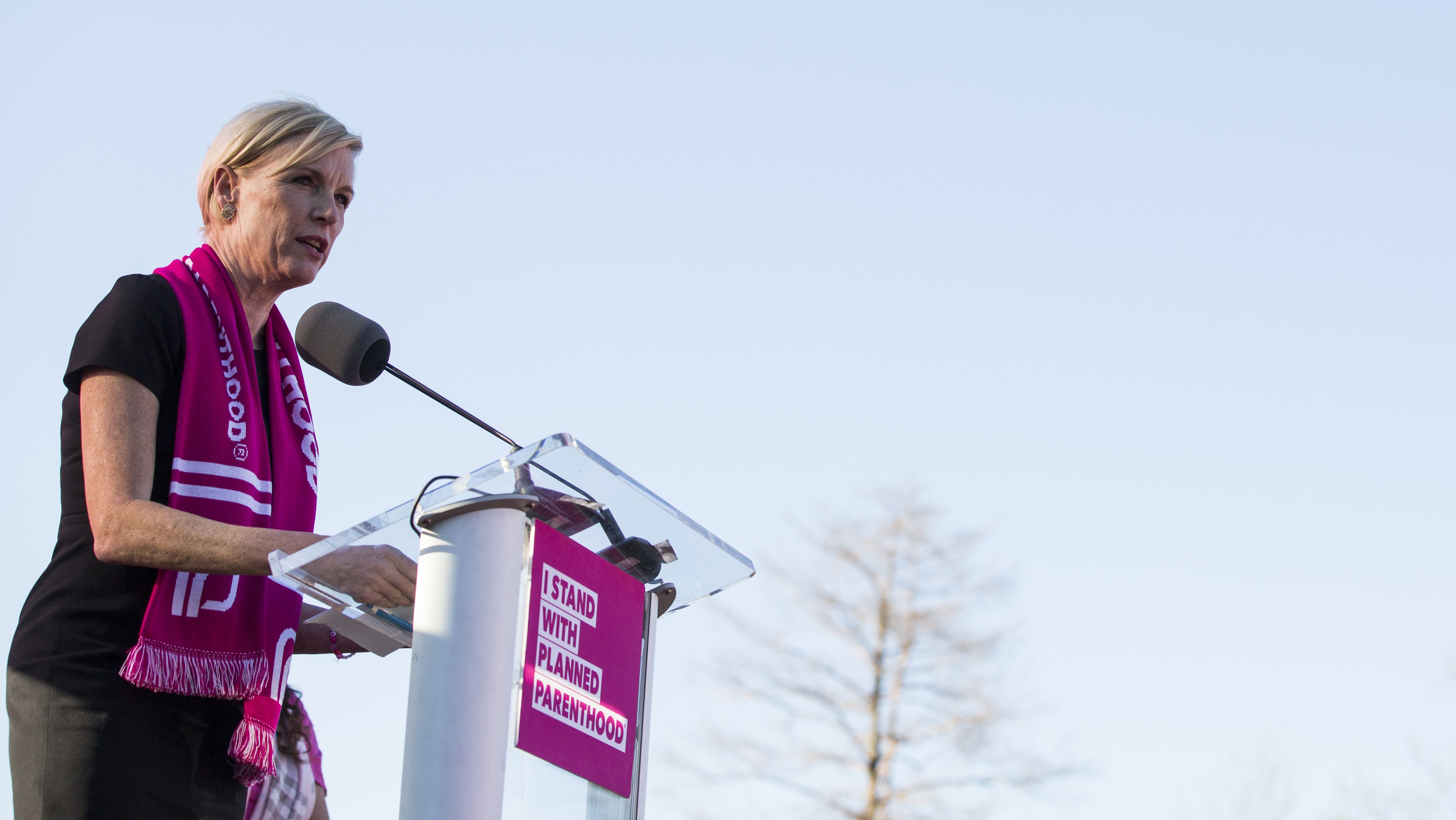

Cecile Richards has had quite a year. Lawmakers have been trying to “defund” Planned Parenthood for at least a decade, but with Donald Trump in the White House and the Republican-led Congress working to overhaul our nation’s health-care system, it seemed legislators might finally get their wish. Both houses included a provision in their health-care plans that would have pulled $500 million from the nonprofit—about 40 percent of its budget—for one year. Congress may have failed to pass its proposals this time around, but Richards has been on the front lines too long to rest easy. Marie Claire visited Richards at her office in Manhattan to talk abortion, Ivanka, and whether she’ll ever run for office.
Marie Claire: You’ve been the head of Planned Parenthood for 11 years. How does this year stack up?
Cecile Richards: It has certainly been a year of challenges because so many things we were able to achieve over the last decade in terms of healthcare outcomes for women—we now have a record low for teenage pregnancy, a 30-year low for unintended pregnancy, the lowest rate of abortion since Roe v Wade was decided—are now at risk. But I’ve also never seen the outpouring of engagement, particularly among women, standing up and fighting for what they believe is rightly theirs, and fighting not only for themselves, but a whole generation. So, if there was any silver lining to this year, it’s that!
I would love it if Paul Ryan would come see our center and visit with these women, and then tell us: What is it that you object to?
MC: Senator Elizabeth Warren said on the Senate floor recently that she’s tired of having to explain what Planned Parenthood does (and doesn’t do), and I thought, “Well, gosh, how must Cecile Richards feel.”
CR: Look, some people say, “What could ever change their minds?” I think the one thing that would change anyone’s mind is coming to a Planned Parenthood Health Center. Visit with our patients, speak with our staff, our doctors, our clinicians, and see the vital healthcare that we provide every single day. I was just in Speaker Paul Ryan’s district. We have three health centers there that provide only preventative services like family planning and pap smears—they don’t provide abortion. And now the women there are at-risk of losing access to care if our centers close. They’re panicked because if you’re in Racine, Wisconsin, and Planned Parenthood isn’t available to you, there’s isn’t anyone else providing birth control there. So I just wish, even Paul Ryan, I would just love it if he would come see our center and visit with these women, and then tell us: What is it that you object to? And what do you want to tell your constituents about where they’re supposed to go if their local Planned Parenthood closes?
I think, look, until we have more people in Congress who have had to deal with a lump in their breast and are worried about, “Can I find an affordable provider that can see me now?” things are not going to change.

Richards speaking at the Planned Parenthood 100th Anniversary Gala on May 2, 2017.
MC: How does it feel to constantly be under attack?
Stay In The Know
Get exclusive access to fashion and beauty trends, hot-off-the-press celebrity news, and more.
CR: I have always worked in some area where it wasn’t easy for organizations that I think move us forward—whether it’s for voting rights or women’s rights or environmental rights. So, if I wasn’t in the midst of controversy, I probably would be in the wrong job. But, also, one of the things that is so important to me about Planned Parenthood is that we have the vast majority of the country supporting us. When you have one in five women in this country who’ve been to you for healthcare, that is a very deep well to draw from. So, it’s an interesting organization—you may feel like you’re on the front lines, but you never feel alone.
MC: What goes through your mind when you hear male legislators saying things like, “Well, I don’t understand why men should have to pay for birth control or maternity care.”
CR: It’s extraordinary. Everyone had a mother at some point, right? That is something that seems to be completely lost. And not just our mothers—there are members of Congress who have wives, daughters, some of them have granddaughters. Can you imagine? Basically, what, of course, concerns me is that probably their relatives—because they have Congressional health insurance— they’ll always be able to get coverage. But what about other women? I heard a young woman speaking at a town hall meeting, who said, “I’ll be the first person in my family to graduate from high school and college, and so why are you taking my access to family planning that can help me actually be part of the American Dream that we all desire?” It’s very hard to see the double standard, and I don’t see anybody trying to take away men’s access to healthcare. That seems to be pretty well intact.
"Why are you taking my access to family planning that can help me actually be part of the American Dream?"
MC: Yeah, men can still get their Viagra covered.
CR: Exactly! The whole reason we ever got family planning covered in insurance plans is because they started covering Viagra, and it became so embarrassing to say, “We’ll cover one and not the other.” But now we see this boulder is rolling back downhill.
MC: Can you tell us a bit about what you did behind the scenes to stop the healthcare bill? Do you actually pick up the phone and call members of Congress yourself?
CR: Oh, definitely! Oh my gosh, I talk to senators all the time. And I go to their states. But it’s also important that senators not just hear from me—they need to be hearing from folks back in their hometowns. I used to work on Capitol Hill and I know that, at the end of the day, no matter how smart lobbyists are or whatever argument you could make, what legislators really want to know is, what are the women back home saying? So I spend a lot of time on the road making sure those folks are being heard.
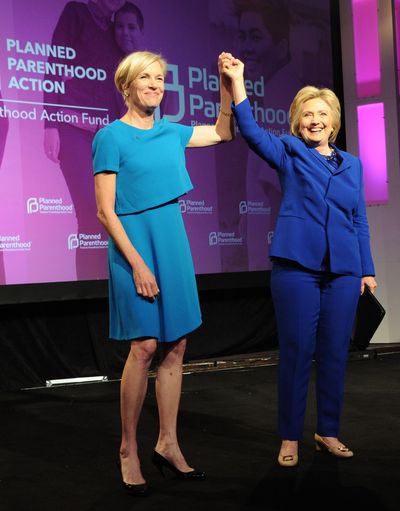
Richards with 2016 Democratic Presidential nominee and Planned Parenthood supporter, Hillary Rodham Clinton.
MC: Let’s talk about the attacks on birth control specifically. If the GOP wants to reduce abortion, then why make it harder or more expensive for women to access contraception?
CR: The U.S. Health and Human Services department is now chock full of people who don’t believe in birth control. And so we’re seeing the unraveling of the birth control benefit that 55 million women in the country fought for and earned under the Affordable Care Act. Now they are basically saying to employers, ‘You don’t have to cover birth control in your insurance plans,’ and that doesn't make any sense! This is one of the most commonly used prescription medicines in the country. And every medical report and research study shows when women are denied access to birth control, you can guarantee two results: One is more unintended pregnancy, and two is more abortion. The policies that this Congress and this administration are pursuing are going to have those exact results.
MC: I wanted to give you the chance to address one of the biggest arguments people make against Planned Parenthood: The idea that money is fungible, and so even though the federal funding Planned Parenthood receives doesn’t pay for abortion, it helps the organization keep the lights on. What do you say to that?
CR: We operate just like every other hospital or healthcare provider—we get reimbursed for services directly, the money is not fungible. The federal government reimburses us for birth control, pap smears, breast exams, STI testing and treatment, and one of the cruel ironies is we actually have to raise money to supplement Medicaid payments because they’re so low. So the thought that any of that money is going to go anywhere else other than to the non-abortion services we provide is just not accurate. And I feel like there’s a double standard that Planned Parenthood is being held to because hospitals that provide abortion services get billions of dollars in Medicaid funding, so why is it that Congress is targeting the one healthcare provider that is primarily focused on women’s health?
RELATED STORY

MC: Given that abortion represents just three percent of the overall services Planned Parenthood provides, do you ever wish the procedure was less associated with the brand?
CR: No. It might be a small portion of what we do, but it’s incredibly important that women have access to safe, legal abortion. Now, do I think as a country we could be doing a lot more to reduce unintended pregnancy and the need for abortion? Absolutely. That’s what we do every day. But putting politics in-between women and healthcare, or making it more impossible isn’t going to get rid of abortion. It’s just going to make it unsafe, and we see that in states already.
MC: Shortly after the inauguration, you met with Ivanka Trump at her request. What can you tell us about the meeting?
CR: The important thing to say upfront is, I’ll meet with anyone about Planned Parenthood if there’s an opportunity to educate them about what we do and the healthcare that we provide, and that’s why I met with Ivanka. She expressed interest and even support for Planned Parenthood. And that was really the tenor of the conversation. She said, “My father is against abortion.” And, look, I believe that’s his right, but it’s not his right to make that decision for every woman in America. That’s simply not what he was elected to do. And that’s what I said to her.
I also talked to her a lot about the work that we’re doing that’s really amazing. We just did clinical research for a self-injectable birth control shot that lasts for three months. Just think how that could change options for women in rural America. To me, that’s what we should be talking about: How do we make medical advances that help women’s health? So I don’t know what I hope for, but I will say, I have never seen a White House that is less responsive and, frankly, more aggressively on the attack on women’s healthcare. So, if Ivanka Trump has influence in this administration, this is the time to make it shine.
If Ivanka Trump has influence in this administration, this is the time to make it shine.
MC: Given Ivanka’s support of Planned Parenthood in the past, do you wish she was doing more to protect women’s healthcare now?
CR: As a special advisor in charge of women’s issues in the White House, that is her job. We hold everyone in government accountable not by how nice and well-meaning they are, but by what they are doing. Women are backsliding in so many areas under this administration and that’s her responsibility. It’s a mystery to me what the agenda is in this White House around women, unless it is to try to put us back 50 years.
MC: Let’s talk about the worst-case scenario. Federal funding is 40% of Planned Parenthood’s budget, or about $500 million. So, let’s say Congress is actually able to defund Planned Parenthood, what happens the next day?
CR: We’ve completely put in place plans for what we would do in that scenario. To me, the most important thing is that we maintain our footprint across this country and that we continue to see women in need. Because frankly, if Congress succeeds, it’s not going to be just Planned Parenthood that suffers—there are going to be millions of people who are going to lose their healthcare coverage. And so our plan isn’t just about us as an organization—it’s about the millions of folks who are going to lose access to care. I hope we don’t get to that day, but we plan for any eventuality.
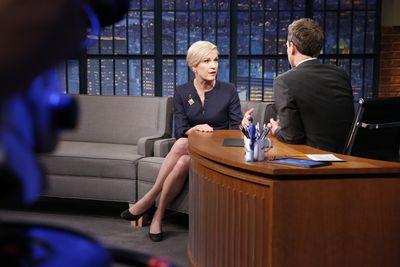
Richards on Late Night with Seth Meyers, May 2017.
But look, Planned Parenthood has been around 100 years and we’re going to be around 100 more. We’re scrappy, we’re inventive, and we will survive. The real fundamental thing that keeps me up at night is, what happens to the women that can’t see us anymore? Because I’ve seen too much of that already in states like Texas where we’ve seen a doubling of the maternal mortality rate because women don’t have access to basic preventive healthcare service. That’s what should be on the conscience of every member of Congress as they vote to take away women’s access to care.
MC: You’ve said previously that you don’t have any plans to run for office because you love your job, but is there any scenario in which you see yourself running? And if you were to run, what would your campaign slogan be?
CR: I think it would be, “Why not a woman?” Like, men, why don’t you take a break for a minute? Let women actually see if we can work on some of these issues. Look, never say never, but I don’t really think that’s my path. I will say, it’s really exciting so many Planned Parenthood activists, patients, and even staff are now filing to run for office because I think that’s why we’re in the fix we’re in. If more members of Congress could get pregnant, we wouldn’t be fighting about Planned Parenthood.
Kayla Webley Adler is the Deputy Editor of ELLE magazine. She edits cover stories, profiles, and narrative features on politics, culture, crime, and social trends. Previously, she worked as the Features Director at Marie Claire magazine and as a Staff Writer at TIME magazine.
-
 Iconic Throwback Photos From the Met Gala
Iconic Throwback Photos From the Met GalaCouture with a side of drama.
By Katherine J. Igoe
-
 Daisy Edgar-Jones Goes Boho Chic Twice in 24 Hours
Daisy Edgar-Jones Goes Boho Chic Twice in 24 HoursShe's committed to the trend.
By Kelsey Stiegman
-
 Zara's Underrated Sister Brand Is Quietly Going Viral
Zara's Underrated Sister Brand Is Quietly Going Viral23 finds worth shopping from Massimo Dutti's newest collection.
By Julia Marzovilla
-
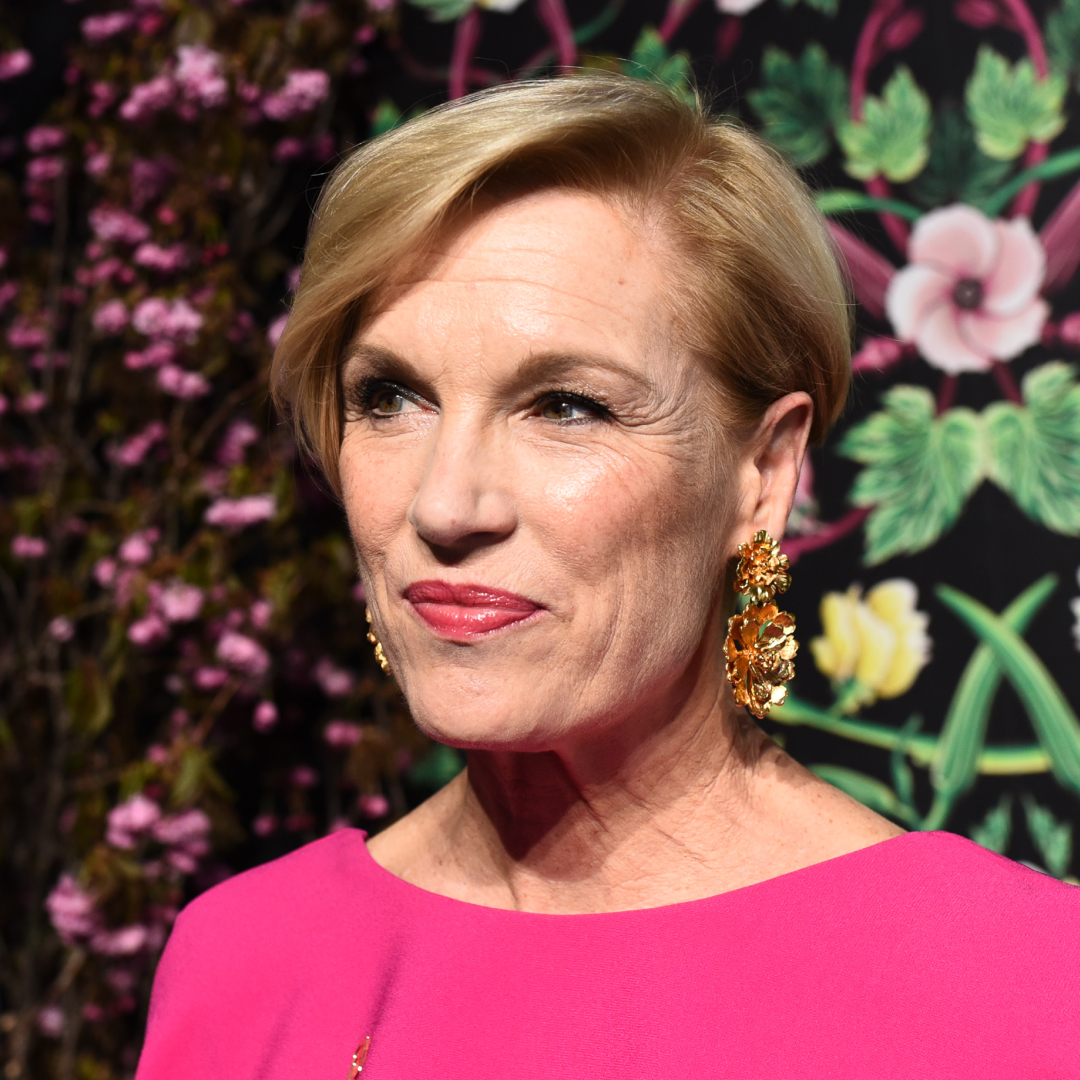 Cecile Richards, Former Planned Parenthood President and Women's Rights Activist, Has Died at Age 67
Cecile Richards, Former Planned Parenthood President and Women's Rights Activist, Has Died at Age 67"Our hearts are broken today but no words can do justice to the joy she brought to our lives."
By Amy Mackelden
-
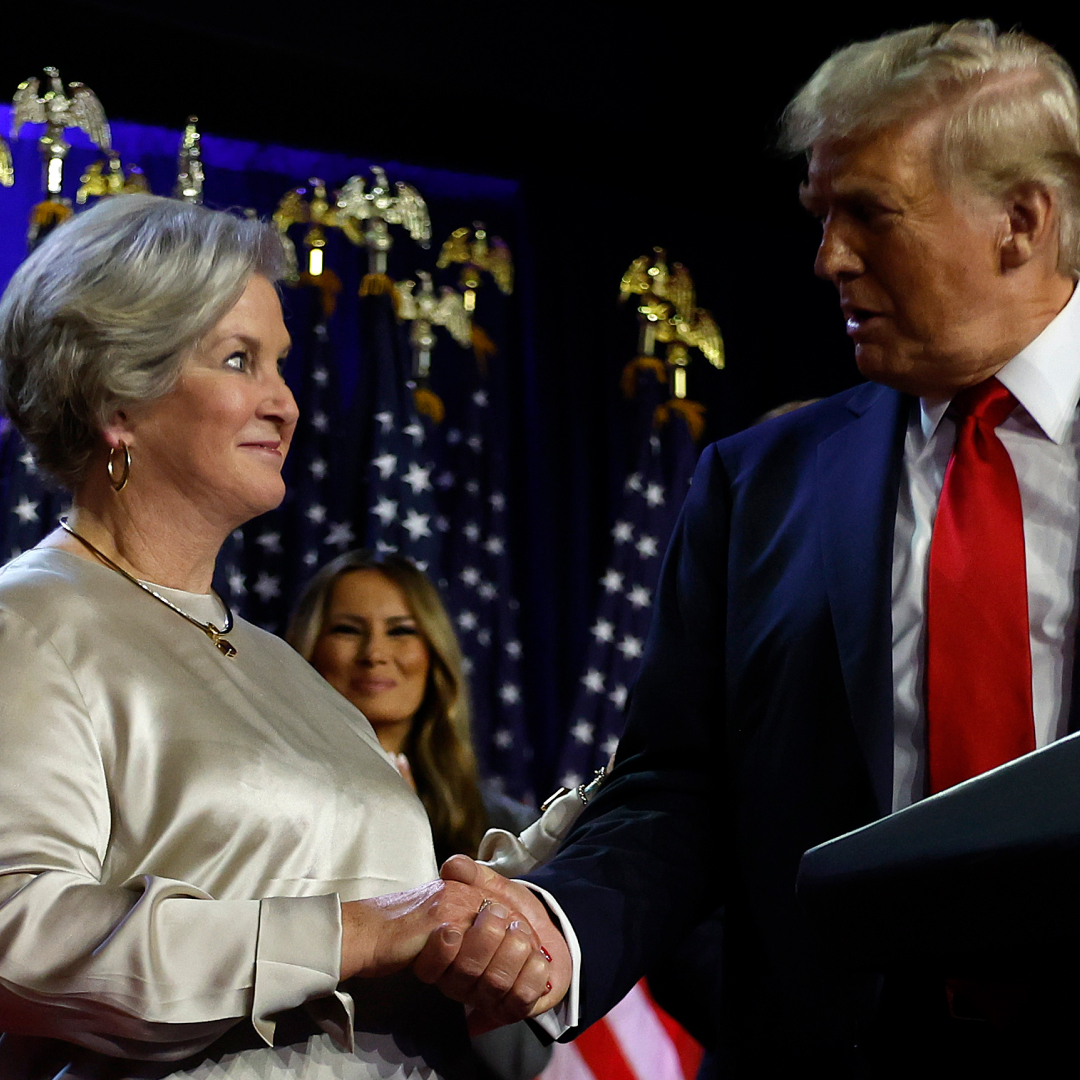 Who is Susie Wiles? President-Elect Donald Trump Names His White House Chief of Staff
Who is Susie Wiles? President-Elect Donald Trump Names His White House Chief of StaffThe political consultant helped the former president run his successful 2024 campaign.
By Danielle Campoamor
-
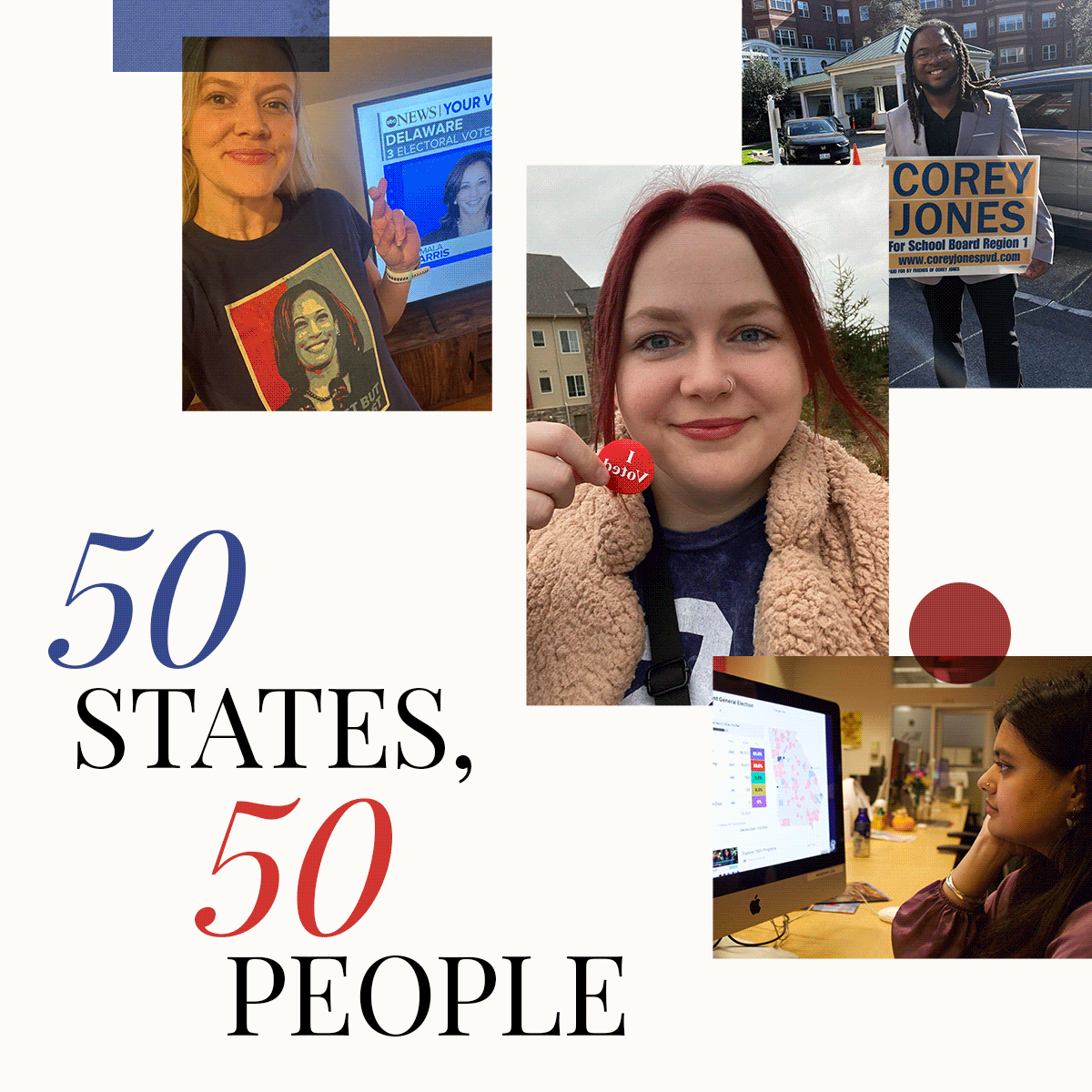 A Nationwide Reaction to the 2024 Election
A Nationwide Reaction to the 2024 ElectionHow are people feeling in this moment? Marie Claire spoke to folks across the country to find out what they were thinking as they cast their votes and waited to hear the results.
By The Editors
-
 The Historic Election Victories Worth Celebrating
The Historic Election Victories Worth CelebratingIncluding momentous firsts, abortion protections, and New York's "Equal Rights Amendment."
By Iris Goldsztajn
-
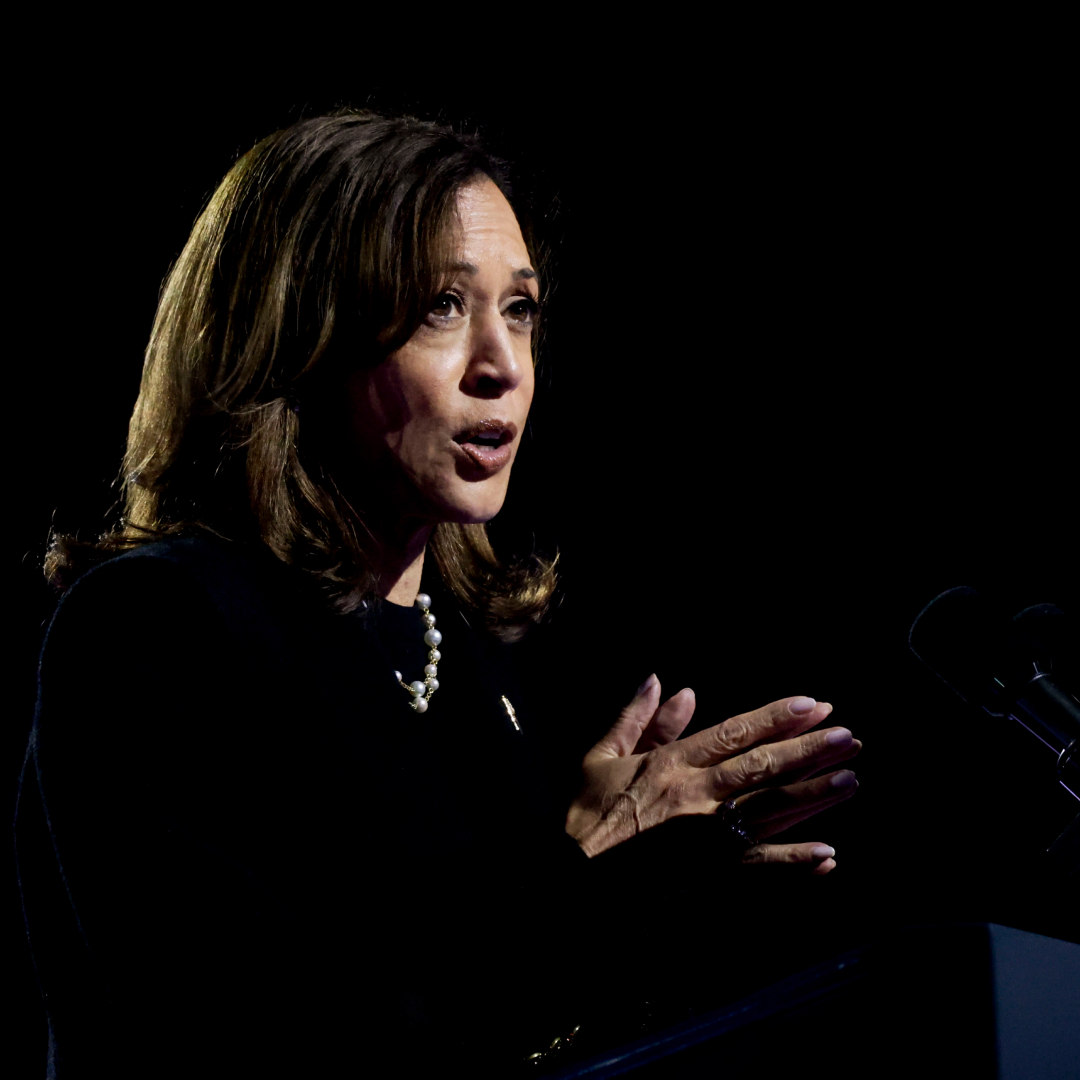 Kamala Harris Has Lost the 2024 Presidential Election
Kamala Harris Has Lost the 2024 Presidential ElectionIt's official.
By Jenny Hollander
-
 Donald Trump Is Ordered to Pay E. Jean Carroll $83.3 Million in Damages
Donald Trump Is Ordered to Pay E. Jean Carroll $83.3 Million in DamagesCarroll had filed two defamation suits against the former president.
By Gabrielle Ulubay
-
 E. Jean Carroll Triumphs Over Donald Trump In Civil Suit
E. Jean Carroll Triumphs Over Donald Trump In Civil SuitA jury found him liable for sexual abuse and defamation.
By Gabrielle Ulubay
-
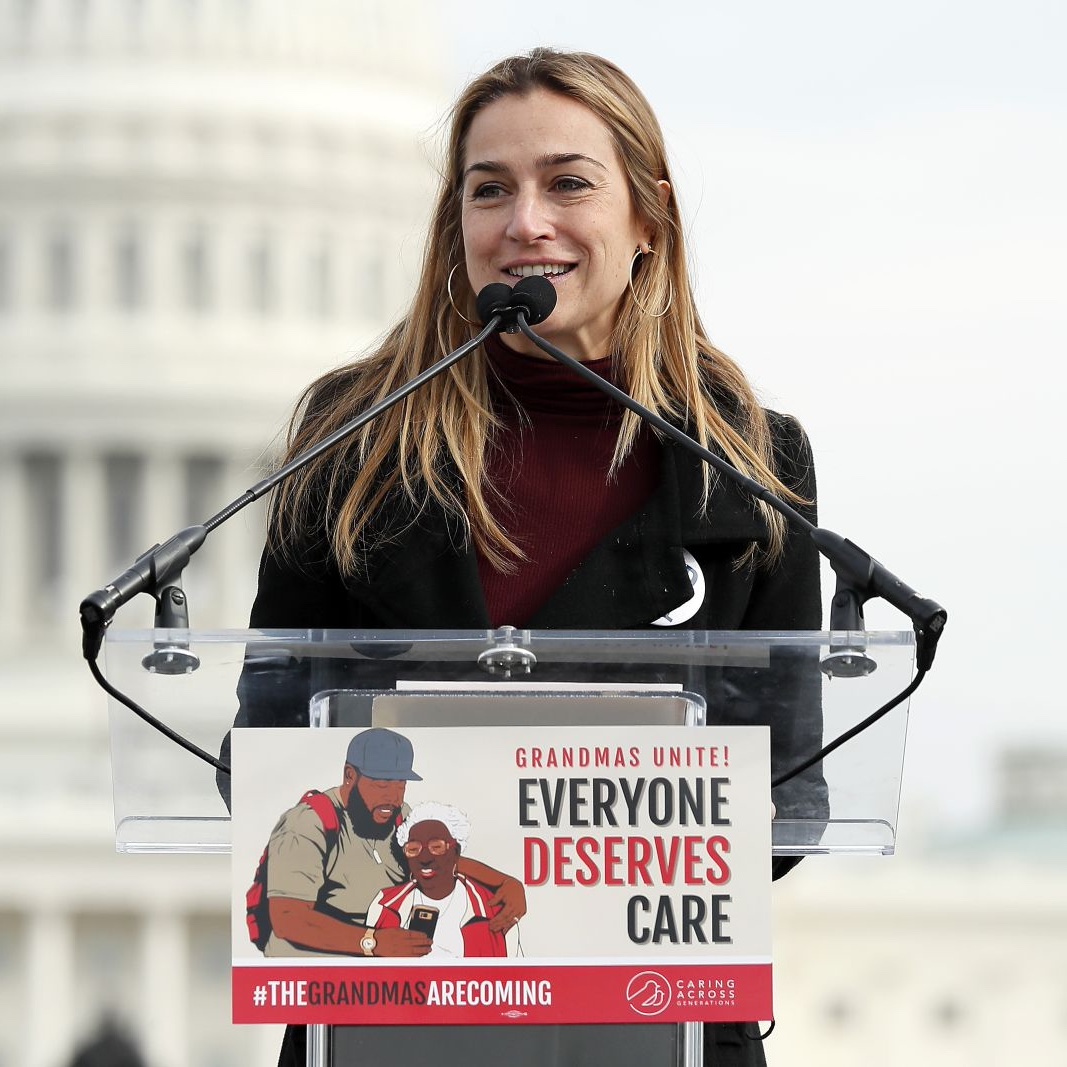 What's the Holdup in Biden's Push for Paid Leave?
What's the Holdup in Biden's Push for Paid Leave?The president is proposing $325 billion to fund paid family leave—the strongest budget proposal in history—and pushing for free universal pre-K nationwide. But he faces opposition.
By Dawn Huckelbridge